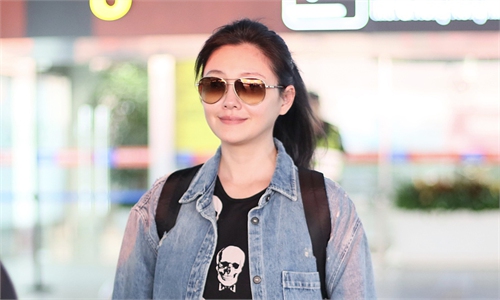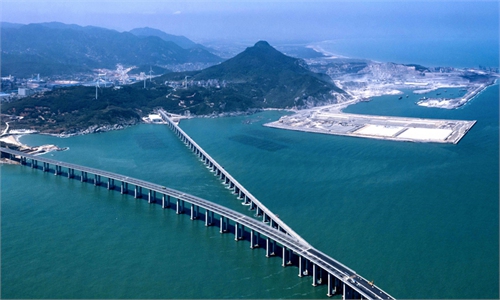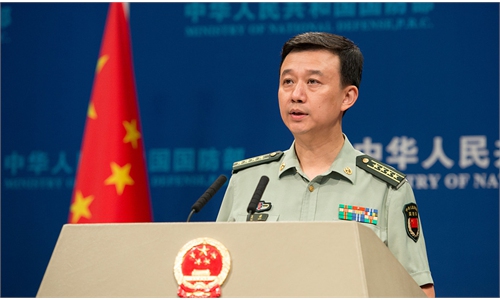TV hostess Dee Hsu says she's not a secessionist; DPP accused of causing hostility, pressuring stars

Taiwanese TV hostess Dee Hsu Photo: CFP
Popular Taiwanese TV hostess Dee Hsu clarified on Thursday that she is not a "secessionist" after several brands terminated their cooperation with the star and her daughter for describing the island's Olympic athletes as "national players" and supporting an athlete who referred Taiwan as a nation.
Her controversial comments came amid strained tension between the Chinese mainland and the island of Taiwan and quickly met a flood of furious comments from mainland netizens. The conflict was grabbed by the island's secessionist Democratic Progressive Party (DPP) to leverage their latest attack against the mainland.
Observers from both sides of the Straits stressed that blaming stars for their verbal gaffes, or netizens for their sensitivities, would create a distraction from the issue. They pointed out that the focus of this incident should be on the Taiwan secessionists who politicize sports and the DPP authorities who repeatedly play the anti-China card as they are the main culprits for the tensions among netizens across the Straits.
Known as Little S, Hsu showed her support for the island's athletes in the Tokyo Olympic Games on her Instagram account and said she wanted to invite "our national players" to her house for a meal. Her comment irritated some netizens from the Chinese mainland who called Hsu a traitor and suggested she quit show business on the mainland.
Online critics over Hsu escalated after mainland netizens found one of the athletes she praised, men's badminton doubles gold medalist Lee Yang, said he wanted to dedicate his championship, "the highest honor in Olympics, to his country, Taiwan."
Netizens then flooded the Hsu's Instagram and Twitter-like Sina Weibo account slamming her as a two-faced person and urging her to never come to the mainland to earn money since she is keen on supporting Taiwan secessionism.
Hsu has since deleted the comments but it could not stop several brands from cutting ties with her. Media estimated that the Hsu lost about 7.4 million yuan ($1.15 million) over the termination of these contracts.
However, some people preferred to treat Hsu's comment of "national players" as a comment meant to be a joke or an occasional lapse as she has never shown any tendency towards secessionism before. Hung Hsiu-chu, a former head of the Kuomintang, the main opposition party, said Hsu in her knowledge has "deep attachment to the mainland" and she has "never made any remarks on supporting secessionists before."
Hsu has been popular on the mainland for her spontaneous character and her friendly attitude towards the mainland. She used to support former Taiwan leader Ma Ying-jeou from the mainland-friendly Kuomintang. She also criticized the DPP's decision to ban exports of medical masks in the early stages of the COVID-19 pandemic, stressing that people across the Straits should help each other and resentment is more dreadful than the virus.
However, the DPP cannot wait to make use of the conflict and interpret it in a direction that favors their stance, observers noted.
"The DPP never revealed the real problem to Taiwan residents. Why Hsu's speech triggered such a huge controversy? The point is that the people on the mainland cannot bear the island anymore. A little spike can trigger an explosion in a place full of gas," Yok Mu-ming, former president of the pro-unification New Party of Taiwan, said on his Facebook account.
DPP politicians always said that the mainland should learn from the island to respect the public's opinion. However, can't the public on the mainland have their opinion? It is the Taiwan secessionists who angered mainland netizens and caused a clash between the 23 million people on the island and the 1.4 billion people on the mainland, said Yok.
The island of Taiwan participates in the Olympic Games under the name of Chinese Taipei, meaning athletes should focus on the competition within the Olympic framework, not on politics, Min Zhe, a cross-Straits observer, told the Global Times.
The athlete who posted seditious comments on social media hurt the feelings of the people of the mainland. Celebrities should also cherish their images and know their social responsibilities, Min said.
However, some politicians in the island have poured oil on the hot blood to sell their political opinions. What they have done hurt the athletes and the sport and they have sacrificed cross-Straits relations and the feelings of the people on both sides, Min stressed.
The DPP was criticized for politicizing sports and instigating public opinion as they sent military airplanes to welcome the island badminton team which defeated their rival from the mainland, while the weightlifting team, also a gold medal winner, did not receive such treatment.
Recently, some Taiwan secessionist groups launched "call me Taiwan team" activities.
The cyber force of the DPP authority also launched a debate online on whether the athletes from the island should be called "Chinese Taipei" or "Taiwan team."
It was the DPP's wanton implementation of the secessionist policy in the past five years that caused the hostility between netizens on both sides, escalating tensions that can burst at any moment, and also putting stars in the island under political pressure, Min noted.




